- Bernard Preston homepage
- Beekeeping
- What Is a Raw Honey
What is a raw honey?
What is a raw honey? It's one of the luxuries in life that only those in the know can enjoy. Unless you are absolutely certain otherwise, assume what you are buying at the supermarket has been heated to some extent; many beekeepers use a hot knife to decap the combs. And it may well be adulterated.
What's special about raw honey? An enzyme called glucose-oxidase is what makes it unique.
It is added by the bees to the nectar from the blossoms; it is vital in the production of hydrogen-peroxide, the agent that gives raw honey its antibacterial activity.
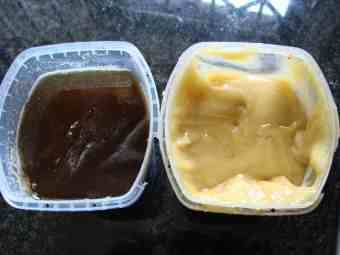 Runny and set raw honey.
Runny and set raw honey.This page was last updated by Bernard Preston on 29th July, 2024.
Glucose oxidase is particularly heat-labile. It's the presence of this enzyme that makes raw honey a special ingredient in the treatment of varicose ulcers, bed sores and burns for example.
Is raw honey safe for infants?
It is also the reason more controversially why honey is used by some paediatricians in the treatment of diarrhoea in infants.
I say controversially because there are in total eight reported cases of infants who contracted botulism, thought to have been after eating raw-honey. But these toddlers were all probably exposed to common dirt; earth where the bacterium is usually found.
What is more there are about 100 cases of infant-botulism in the USA every year, probably none of which were exposed to raw honey. There are very
few families that have ever had the joy and allegedly the danger of enjoying the sublime unprocessed product of the bee. It is an old wives' tale as far as I am concerned; all of our children were raised on it for sweetening instead of sugar.
One of the most nasty conditions on the lower leg, a varicose-ulcer is best treated with a patented medicine that consists mainly of raw honey and certain herbs.
Other doctors recommend the use of a paste of freshly-ground turmeric and raw honey for bedsores.
What is a raw honey? It's a medicine used for many ailments. But do eat it in small quantities.
"My son, eat honey for it is good; and the drippings of the comb are sweet to your taste."
- Proverbs 24
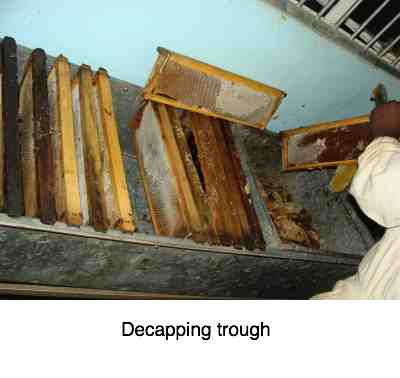
Unheated honey is a very special food in my opinion; in moderation. The taste is divine, the micronutrients invaluable and the heat-labile enzymes beneficial to digestion.
One of the difficult decisions I have had to make concerns the hot-knife vs fork honey decapping debate. After years of prevarication I have switched.
The gleanings after decapping with an electric knife are problematic; they have been heated. We used to put them out for the bees to clean up but unfortunately they war over them; and may pick up diseases too. My solution now is making honey beer.
Unprocessed honey, only available from your
local small beekeeper is also usually lightly filtered allowing
small particles of pollen and the wax-cappings into the honey. These are
beneficial for people suffering from asthma, hay fever and sinusitis.
But
all honey, raw or commercial, must be eaten in conjunction with fat,
fibre and preferably protein too; for example, in an oats-porridge or on a wholewheat cheese sandwich. Why is that?
Beekeeping equipment
There are few hobbies in which you can recoup your basic costs of your equipment in the
first year. Good honey is such a valuable product, really mostly quite
unavailable; you can, should you desire charge the earth for it. Much will be given to family and friends.
Discerning folk will pay a premium but don't overcharge; is good old-fashioned greed not one of the mortal sins?
I have had apiaries for more than half a century and still the bees retain their fascination. They rank above gliding, trout-fishing and carpentry; and even challenge gardening and all my other hobbies for pride of place.
You could do it also. Actually it's the rave even in inner cities. Getting back to nature is so relaxing; provided you do not have African killer-bees as I do. They are possibly too dangerous to keep in close proximity to humans and animals.
The cost of basic beekeeping equipment really is not exorbitant and like I said, you'll recoup it in one or two seasons; such is the value of unheated, totally unprocessed honey. Connoisseurs will pay extra for it; and rightly so.
Yesterday a feral swarm arrived unannounced and took up residence in a pile of old hives behind my garage. Bringing my granddaughter home today, aged only four, the scent pricked up her nose. Bees, yes and they brought umpteen pounds of honey with them; the air, perfumed with the aroma of literally millions of flowers was divine.
Beekeeping is for all to enjoy; unless someone in your family is very allergic to the venom in their stings.
Interesting research recommends exposing infants from the age of six months regularly to small amounts of allergens like nuts, gluten and egg. But does one get a tiny sting?
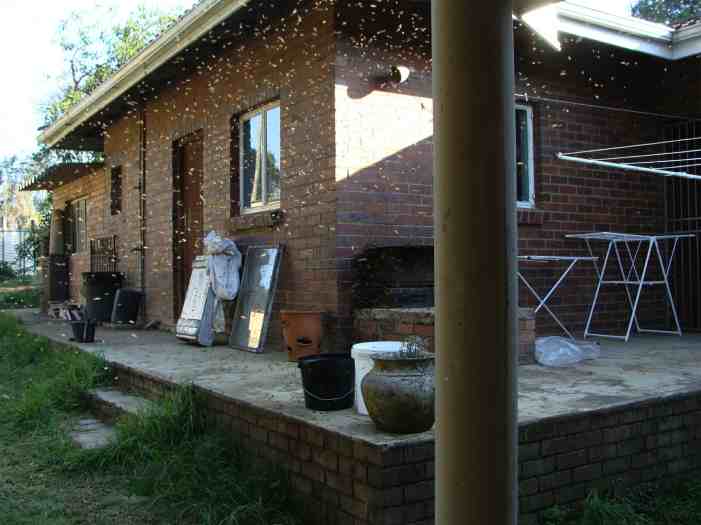
How to start beekeeping
Beekeeping has become in vogue. It's one way to relax, to help the environment and to build a greener world. If you live in the Northern Hemisphere which has in the main the relatively tame Italian specie, then you can keep a swarm on a balcony or in your backyard; being in a built-up area is not a problem.
Start by reading manuals or going to courses on how to start beekeeping; then you too can have raw honey and eat it.
It is about the only way to get raw honey; unless you know a local beekeeper.
African bees are another story; they are positively dangerous and must be treated with great respect. They can turn on you in an instant for no known reason.
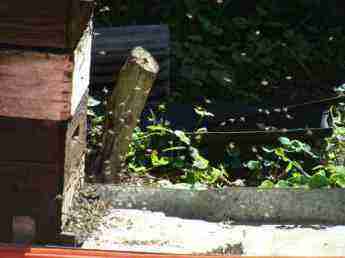
Honey bee traps
Honey-bee traps are usually placed a few feet above the ground.
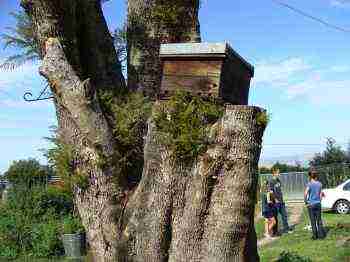
Trapping wild swarms of bees is as easy as putting up an empty hive on a tree-stump. During the honey flow when they split it is simple to increase your apiary.
Even in Florida in the USA with no indigenous-bees, for example feral colonies abound and can be easily captured. Then you can answer the question, what is a raw honey, yourself.
Phytochemical Foods
March, April and May are the exciting months in South Africa; walking past the apiary there is the divine scent of millions of flowers pervading the whole garden. It is all about raw-honey and phytochemical foods.
The bees are busy collecting nectar and turning it into raw-honey, rich in phytonutrients; and the pollen which contains the protein and fats that they too must have.
These are the fragrances that give onions their aroma when you chop them, sweet-basil leaves when crushed and the rich scent of a lime when you handle the fruit and leaves, for example.
What is a raw honey? It's a conglomeration of them all.
There are literally thousands of these phytochemicals in the nectar and pollen from flowers; they are rich in what pretentious people call "floral notes." It is indeed a wonderful scent. They are part of the reason that a salve made from freshly-grated turmeric and raw honey is the best treatment for bedsores at home.
After the bees collect this dilute nectar and start to fill the cells in the hive it must be concentrated to give honey its unique supersaturated qualities; that makes it impossible for bacteria, viruses and yeast-cells to survive.
The sugars in the honey literally suck the water out of bugs, destroying them by osmosis.
Watch near the entrance with a pair of binoculars and you'll see bees fanning air into the hive; it passes over the honeycombs evaporating the moisture, in the same way that wind blowing above the ocean becomes water-laden.
It is this vapour, rich in the "floral-notes" of a million flowers that will delight you whilst walking through a garden with an apiary tucked away somewhere in a protected corner.
Of course most of these delights remain in the raw honey; it is not just the sweetness but the rich flavour of many flowers.
Raw honey can truly be described as one of the many phytochemical foods, rich in a thousand micro-scents to tantalize your palate.
Is honey fattening?
Is honey fattening? Yes and no, let it be said; it certainly has a high calorific value.
However what makes a starch fattening is how quickly it turns to sugar in the blood stream; that is what the glycemic-index measures. Raw honey has a low GI.
What is a raw honey? It's good food; in moderation.
Newsletter
Our newsletter is entitled "create a cyan zone" at your home, preserving both yourself and Mother Earth for future generations; and the family too, of course. We promise not to spam you with daily emails promoting various products. You may get an occasional nudge to buy one of my books.
Here are the back issues.
- Lifestyle and ideal body weight
- What are ultra-processed foods?
- Investing in long-term health
- Diseases from plastic exposure
- Intensive lifestyle management for obesity has limited value
- A world largely devoid of Parkinson's Disease
- The impact of friendly bacteria in the tum on the prevention of cancer
- There's a hole in the bucket
- Everyone is talking about weight loss drugs
- Pull the sweet tooth
- If you suffer from heartburn plant a susu
- Refined maize meal and stunting
- Should agriculture and industry get priority for water and electricity?
- Nature is calling
- Mill your own flour
- Bake your own sourdough bread
- Microplastics from our water
- Alternative types of water storage
- Wear your clothes out
- Comfort foods
- Create a bee-friendly environment
- Go to bed slightly hungry
- Keep bees
- Blue zone folk are religious
- Reduce plastic waste
- Family is important
- What can go in compost?
- Grow broad beans for longevity
- Harvest and store sunshine
- Blue zone exercise
- Harvest and store your rainwater
- Create a cyan zone at your home
Can diabetics eat raw honey?
So the white-starches and in particular the refined ones like cake flour have very high GI's.
White bread, potatoes from cold-storage and refined rice are all
very rapidly turned into sugar calling for an insulin rush, storing it
as fat; cakes and cookies too obviously.
Processed honey too has a high glycemic-index; heating and extraction of the pollen changes it's properties dramatically.
It is thought that it is the protein and fat in the pollen in natural honey that reduces the GI.
Non-caloric artificial sweeteners, known as NAS are a dangerous alternative to sugar and raw honey. They alter the chemical pathways in the bugs in the intestine known as the microbiota, inducing metabolic disease in humans[1].
Unhappy microbiota also allow pathogens to gain a foothold; researchers have now established beyond doubt that it is where the twisted tau-proteins that cause the neurodegenerative conditions like Alzheimer's disease originate.
Whatever don't get into saccharin and the like; the artificial-sweetener side effects are positively dangerous[3].
This is a vast and complex subject. But let it be said that enjoying complex, unrefined carbohydrates, known as "resistant starches" is hugely important for our overall good. They are much less fattening and promote well-being. They pass through the small intestine partially undigested, instead feeding the microbiota in the colon.
Can diabetics eat raw honey? Yes, certainly but I would recommend limiting how many teaspoons; and test the response of your blood glucose.
And always in the context of a whole meal; never just a teaspoon for some energy.
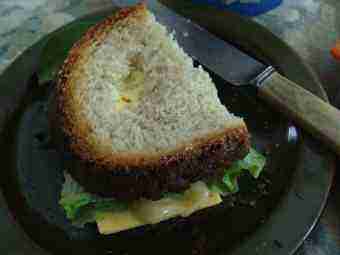
Savour a little honey on artisan bread with a slice of cheese and lettuce; the whole sandwich becomes a decidedly low-GI food.
Are you thinking that making your own bread is a labour of love requiring hours? It takes me literally five minutes every morning to make this Panera bread menu recipe. Combine the aroma of freshly-baking bread with raw honey and you have a meal beyond description.
Add some protein and fat to your Panera bread and you have a marvellous low GI sandwich; it is simple. You can make it yourself in a jiffy. The stone-ground wholewheat flour is what makes your homemade loaf so nutritious.
Raw honey for weight loss
Researchers took 48 type-2 diabetics not on insulin, and divided them into two groups; one received quite large amounts of what they called natural honey and the other a control.
The honey group started with 10 tsp per day, increasing to 25; that is a lot. Researchers were astonished when they found an average weight-loss of 1,8 kg in only 8 weeks.
The control folk did not lose any weight.
Furthermore the lipid profiles of the honey group improved significantly and there was no increase in fasting blood-glucose. However the downside was that taking 25 tsp per day did increase the HbA1c from 7,1 to 7,7[2]; not surprisingly. That amount is excessive in my humble opinion.
Obviously more research needs to be done; natural honey has many benefits which you can read about at that study. But 25-teaspoons per day is clearly too much of a good thing; not just for diabetics but for all of us.
HbA1c is a measure of blood glucose over two months. It was already significantly raised before the start of the experiment; and to increase it further is not good. Around the 5.5 mark is the right value, some say even lower.
I take only about 3 teaspoons a day; moderation in raw-honey too is the word.
"If you have found honey, eat only enough for you, lest you have your fill and vomit it."
- Proverbs 25
What is a raw honey?
There are two modus-operandi of harvesting honey if you keep the hives in your own garden, depending on the circumstances; only you can choose and in fact may use both.
Never cook with raw honey; the heating ruins the enzymes and phytochemicals that make it so special. We enjoy it in this baklava alternative. The real-thing is disgustingly fattening but delicious it's true. Keep it only for high and holy days; likewise with Greek Halva.
A teaspoon in a rolled oats porridge with a little cream is a wonderful start to the day; the fibre and added fat reduce the absorption of the sugars into the blood-stream. The Scots enjoy it with a pat of butter instead; it has the same effect on the glycemic index which is low if you can get the unrefined grain.
What is a raw honey? It is the only sweetener that will not be your undoing but do enjoy it in moderation with other food; never by the teaspoon.
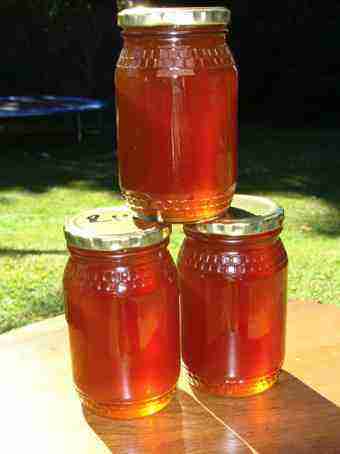
This is what it is all about. If you want it, you have to find a local naturalist who is enthusiastic about raw honey; or begin to consider how to start beekeeping yourself. Seek out a local association where you will learn the rudiments.
Anecdotal lore suggests that beekeepers live long and healthy lives. Find out for yourself what is a raw honey.
Then it is the basic beekeeping-equipment and of course your first hive that must be acquired.
The gleanings of honey by the way make a wonderful braggart; you will need some basic equipment for taking beer hydrometer-readings.
Making honey beer is one of my many passions. Another is a demijohn of mead gurgling sweetly in seclusion; we are in lock-down during the
covonavirus pandemic and dumb officials have banned all sales of
alcohol.
To preserve the planet we need to nurture these little creatures; after all one in four mouthfuls that we eat is pollinated by them. A good way is to plant indigenous trees for bees; and of course other insects too.
Beeswax solar extractor
Wax is a natural and very valuable byproduct of beekeeping; far too special to burn in candles.
Getting it out of old-combs is the very devil unless you make a beeswax solar extractor.
Can you now with some confidence answer the question, what is a raw honey?
USEFUL LINKS
Sources and references
- Artificial sweeteners induce glucose intolerance by altering the gut microbiota @ Nature.com
- Effects of natural honey consumption in diabetic patients: an 8-week randomized clinical trial
- Artificial sweetener side effects. Web: https://tinyurl.com/3p5rt34u
- What is the best honey?
When browsing use right click and "Open Link in New Tab" or you may get a bad gateway signal.
Did you find this page interesting? How about forwarding it to a friendly book or food junkie? Better still, a social media tick would help.
- Bernard Preston homepage
- Beekeeping
- What Is a Raw Honey
Address:
56 Groenekloof Rd,
Hilton, KZN
South Africa
Website:
https://www.bernard-preston.com